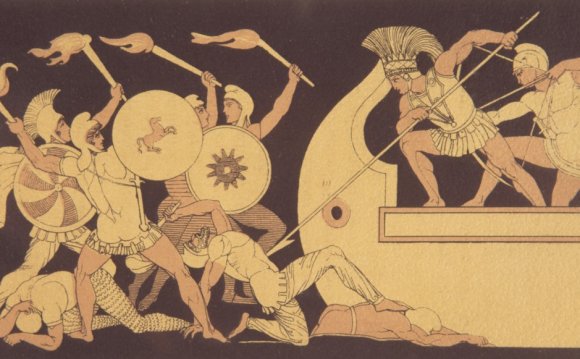
This week in the magazine, Daniel Mendelsohn reviews a new version of Homer’s Iliad, translated by Stephen Mitchell. He also discusses the translation and his piece in this week’s Out Loud podcast.
A good way of getting a sense of the values and priorities of the Iliad’s many translators is to compare how they translate a given passage. The best showcases for these comparisons aren’t necessarily the poem’s “big moments” but smaller, more ordinary passages, such as the one I’ve chosen below, lines 795-800 from Book 13. This is one of the dozens of extended similes that Homer uses to convey how a given event looks and feels—in this instance comparing the massed ranks of Trojan troops preparing for battle to waves breaking on a shore during a wild storm at sea. A reasonably straightforward translation might look like this:
And they went in like a maelstrom of quarrelsome windsthat goes earthward beneath Father Zeus’ thunderbolt
and with an inhuman din churns with the salt sea, the many
roiling waves of the greatly-roaring ocean
cresting, flecked with white, some before, and others hard behind;
So too the Trojans were packed together, some before, others hard behind.
But simply to convey what Homer’s words mean gives no sense of the real challenge that the translator faces, which is to think of ways to reproduce the wonderful sound effects Homer contrives here to evoke the sounds of the sea. Below is a line-by-line transliteration of the Greek text—with the stressed syllables in ALL CAPITALS—with translations of each word or phrase just beneath.
HOI d’isan AR-ga-le-OAN a-neh-MOAN ah-tah-LAHN-toy ah-EL-lay,They went (of quarrelsome) (winds) (resembling) (a maelstrom)
HAY rha th’oo-POH BRON-TAYZ PAH-TROS Di-os AY-si peh-DON deh,that beneath (the thunderbolt) (of Father) Zeus goes earthward
THEH-speh-see-OY d’oh-mah-DOY ha-li MIZ-geh-tai, EN deh teh POLL-ah(with an inhuman) (din) (the salt sea) (churns), and many
KU-mahtah PAH-PHLAH-DZON-tah poh-LEE-PHLOYZ-BOY-oh thah-LASS-aysWaves roiling (of the loudly-roaring) sea
KUHR-ta phah-LAY-ree-oh-OAN-tah, pro MEN T’AHLL’, OW-tahr ep’ ALL-ah:Curved white-capped (in front) some, (but) (hard behind) others
HOSS TROE-EHS pro men ALL-oy ah-RAY-roh-tehz, OW-tahr ep’ ALL-oy(just so) (the Trojans) (in front) some (were packed together) (but)( hard behind) (others)
Note, first of all, how the last words of the first, third, fifth, and sixth lines of this passage all end with the same sound combination, loaded with liquid “l”s (aellêi, “maelstrom”; polla, “many”: ep’ alla, “others hard behind, ” ep’alloi, “others hard behind”): these liquid “l” sounds (with some explosive “p”s thrown in in the third, fifth, and sixth lines) beautifully evoke the sounds of the roiling waters, even as the insistent repetition of the “p-ll” sound cluster from line to line gives a sense of whitecaps breaking on the beach, one after another. (In other words, the near-rhyming words do what the waves do.) And, as if to make the analogy concrete, the sixth line—which reconnects the imagined world of the sea to the narrated world of the Trojans at war—repeats the “some before others hard behind” language of the fifth: the waves are all’ ep alla; the Trojans are alloi ep’ alloi. So the sixth line is packed behind the fifth, imitating its sound cluster precisely the way in which the Trojan ranks, packed together in battle formation, are massed one behind the other.
Also of note is the way that the two adjectives in the fourth line—paphladzonta, the “roiling” waves, and polyphloisboio, the “greatly-roaring” sea—replicate each other’s consonants: the “p”s, the “ph”s, the “l”s, the soft “s”s and “z” sounds. If you repeat those languidly unspooling words, you’re making the noises of the surf.
With that in mind, let’s compare some notable translations of this vivid passage. Here is Richmond Lattimore’s 1951 rendering:
They went on, as out of the racking winds the stormblastthat underneath the thunderstroke of Zeus-Father drives downward
and with gigantic clamour hits the sea, and the numerous
boiling waves along the length of the roaring water
bend and whiten to foam in ranks, one upon another;
so the Trojans closing in ranks, some leading and others
after them, in the glare of bronze armor followed their leaders.
Lattimore is alert to Homer’s effects, particularly his play with consonant sounds. His “drives downward” in line 2 nicely gets the “d” and “n” sounds in the Greek eisi pedon de, “goes earthward”; and I particularly like the way he reproduces all those liquid “l” sounds in his line “boiling waves a long the length of the roaring water.” He also strives to reproduce the “some … other” construction of the Greek in his “one upon another … some leading and others after them.” You’ll notice, too, that Lattimore favors a long, six-beat line that mimics the six-beat line that Homer uses—one of the ways he tries to conjure the grandeur and expansiveness of Homeric verse.
Four decades after Lattimore, Robert Fagles’s 1990 translation took the field, establishing itself as the preëminent English translation. Fagles uses a loose five-beat line. It can be a bit too loose—it sometimes feels like stacked prose—but has an admirable clarity:
Down the Trojans came like a squall of brawling gale-windsblasting down with the Father’s thunder, loosed on earth
and a superhuman uproar bursts as they pound the heavy seas,
the giant breakers seething, battle lines of them roaring,
shoulders rearing, exploding foam, waves in the vanguard,
waves rolling in from the rear. So on the Trojans came,
waves in the vanguard, waves from the rear, closing.
Fagles’s sensitivity to the alliteration of “l” is clear, especially in his first two lines (“squall of brawling gale-winds” is really good), and it’s nice that he tries to suggest Homer’s line-ending alliterations with his end-rhyming “roaring” and “closing”. And at the end of this passage he uses a striking repetition of the word “waves” to suggest the important repetitions of both sounds and words in the original (particularly that “some … others” construction). Some readers will appreciate the way that Fagles (who wrote poetry of his own) amplifies Homer’s “curved” and “white-flecked” waves into waves with “shoulders rearing, exploding foam, ” although a little of this poeticizing goes a long way. The big mistake, to my mind, is the way Fagles blurs the line between the two parts of the simile: the waves and the battle-lines of Trojans. By importing the diction of warfare into the first part of the simile (“battle-lines” of waves, a “vanguard” of waves), he actually weakens the impact of the simile overall. Nonetheless, it’s a strong, successful rendering, with an energy and verve appropriate to the lines themselves.
MORE TRANSLATION VIDEO












